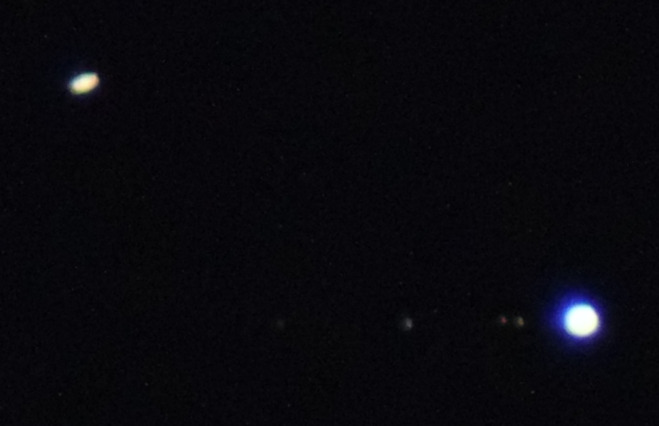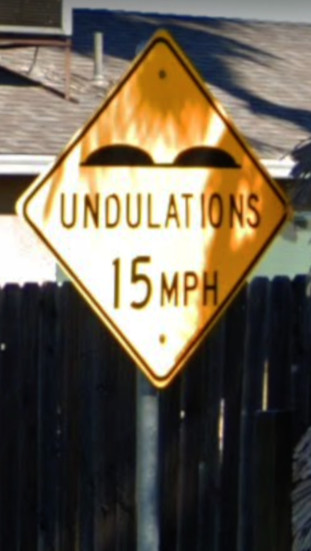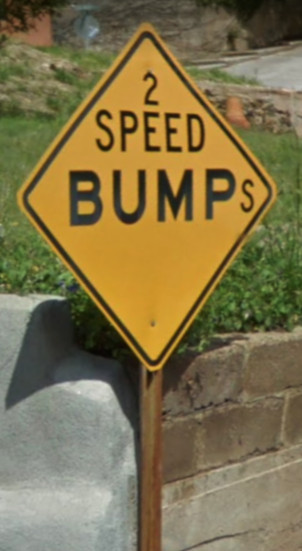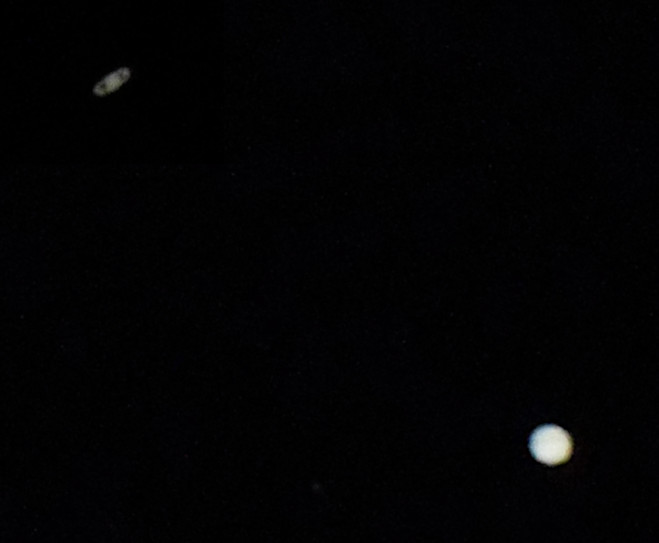December 2020 archive
Saturday 19 Dec 2020 comment?


Saturn and Jupiter
this evening.
I like how four moons of Jupiter are all on one side.
Left to right: Callisto (faint), Ganymede, Europa, Io.
Happy nineteenth, everyone.
I like how four moons of Jupiter are all on one side.
Left to right: Callisto (faint), Ganymede, Europa, Io.
Happy nineteenth, everyone.
Sunday 13 Dec 2020 comment?
John Le Carré died yesterday. I haven't read his books but I like several movies based on them, The Spy Who Came In from the Cold being my personal favorite. I first watched it on DVD about 11 years ago and found it so many-layered that I watched it again the same day to better appreciate it (the only movie I've ever done that with).
I like Le Carré's stories for their understatement, for the shades of gray in their politics, for the moral dilemmas characters encounter, and for the authenticity made possible by the author's extensive real-world experience in espionage. And I like movies set during the Cold War.
John Le Carré died yesterday. I haven't read his books but I like several movies based on them, The Spy Who Came In from the Cold being my personal favorite. I first watched it on DVD about 11 years ago and found it so many-layered that I watched it again the same day to better appreciate it (the only movie I've ever done that with).
I like Le Carré's stories for their understatement, for the shades of gray in their politics, for the moral dilemmas characters encounter, and for the authenticity made possible by the author's extensive real-world experience in espionage. And I like movies set during the Cold War.
Saturday 12 Dec 2020 comment?
From Texas's (denied) motion asking the Supreme Court to take up its case to block the election:
Another of Dr. Cicchetti's calculations arrives at an even more spectacular number, although he botched the phrasing of it in a footnote:
Charles J. Cicchetti does have a Ph.D. (in Economics) and, I'm guessing, knows how dopey his analysis is. It looks to be offered in deliberate bad faith (as does the whole motion).
From Texas's (denied) motion asking the Supreme Court to take up its case to block the election:
The probability of former Vice President Biden winning the popular vote in the four Defendant States—Georgia, Michigan, Pennsylvania, and Wisconsin—independently given President Trump's early lead in those States as of 3 a.m. on November 4, 2020, is less than one in a quadrillion, or 1 in 1,000,000,000,000,000. For former Vice President Biden to win these four States collectively, the odds of that event happening decrease to less than one in a quadrillion to the fourth power (i.e., 1 in 1,000,000,000,000,000⁴). See Decl. of Charles J. Cicchetti, Ph.D. ("Cicchetti Decl.") at ¶¶ 14-21, 30-31 (App. 4a-7a, 9a).I'm not sure how Dr. Cicchetti settled on "less than one in a quadrillion". In a footnote to his declaration, he says his estimate "is actually about 1 in 1 with 2,568 zeros". Maybe he thought a quadrillion was about as big a number as Supreme Court justices could grasp.
Another of Dr. Cicchetti's calculations arrives at an even more spectacular number, although he botched the phrasing of it in a footnote:
⁶ This would be 1 divided by more than 775,000 zeros.I was going to write about what's wrong with Dr. Cicchetti's reasoning but I found a good, concise explanation by David Post, to which I refer readers who are interested.
Charles J. Cicchetti does have a Ph.D. (in Economics) and, I'm guessing, knows how dopey his analysis is. It looks to be offered in deliberate bad faith (as does the whole motion).
current journal
FAQ
search
contact
rss/xml
atom/xml
spam notice
terms of use
warrant canary
archive
FAQ
search
contact
rss/xml
atom/xml
spam notice
terms of use
warrant canary
archive
| jan | feb | mar |
| apr | may | jun |
| jul | aug | sep |
| oct | nov | dec |
| jan | feb | mar |
| apr | may | jun |
| jul | aug | sep |
| oct | nov | dec |
| jan | feb | mar |
| apr | may | jun |
| jul | aug | sep |
| oct | nov | dec |
| jan | feb | mar |
| apr | may | jun |
| jul | aug | sep |
| oct | nov | dec |
| jan | feb | mar |
| apr | may | jun |
| jul | aug | sep |
| oct | nov | dec |
| jan | feb | mar |
| apr | may | jun |
| jul | aug | sep |
| oct | nov | dec |
| jan | feb | mar |
| apr | may | jun |
| jul | aug | sep |
| oct | nov | dec |
| jan | feb | mar |
| apr | may | jun |
| jul | aug | sep |
| oct | nov | dec |
| jan | feb | mar |
| apr | may | jun |
| jul | aug | sep |
| oct | nov | dec |
| jan | feb | mar |
| apr | may | jun |
| jul | aug | sep |
| oct | nov | dec |
| jan | feb | mar |
| apr | may | jun |
| jul | aug | sep |
| oct | nov | dec |
| jan | feb | mar |
| apr | may | jun |
| jul | aug | sep |
| oct | nov | dec |
| jan | feb | mar |
| apr | may | jun |
| jul | aug | sep |
| oct | nov | dec |
| jan | feb | mar |
| apr | may | jun |
| jul | aug | sep |
| oct | nov | dec |
| jan | feb | mar |
| apr | may | jun |
| jul | aug | sep |
| oct | nov | dec |
| jan | feb | mar |
| apr | may | jun |
| jul | aug | sep |
| oct | nov | dec |
| jan | feb | mar |
| apr | may | jun |
| jul | aug | sep |
| oct | nov | dec |
| jan | feb | mar |
| apr | may | jun |
| jul | aug | sep |
| oct | nov | dec |
| jan | feb | mar |
| apr | may | jun |
| jul | aug | sep |
| oct | nov | dec |
| jan | feb | mar |
| apr | may | jun |
| jul | aug | sep |
| oct | nov | dec |
| jan | feb | mar |
| apr | may | jun |
| jul | aug | sep |
| oct | nov | dec |
| jan | feb | mar |
| apr | may | jun |
| jul | aug | sep |
| oct | nov | dec |
| jan | feb | mar |
| apr | may | jun |
| jul | aug | sep |
| oct | nov | dec |




